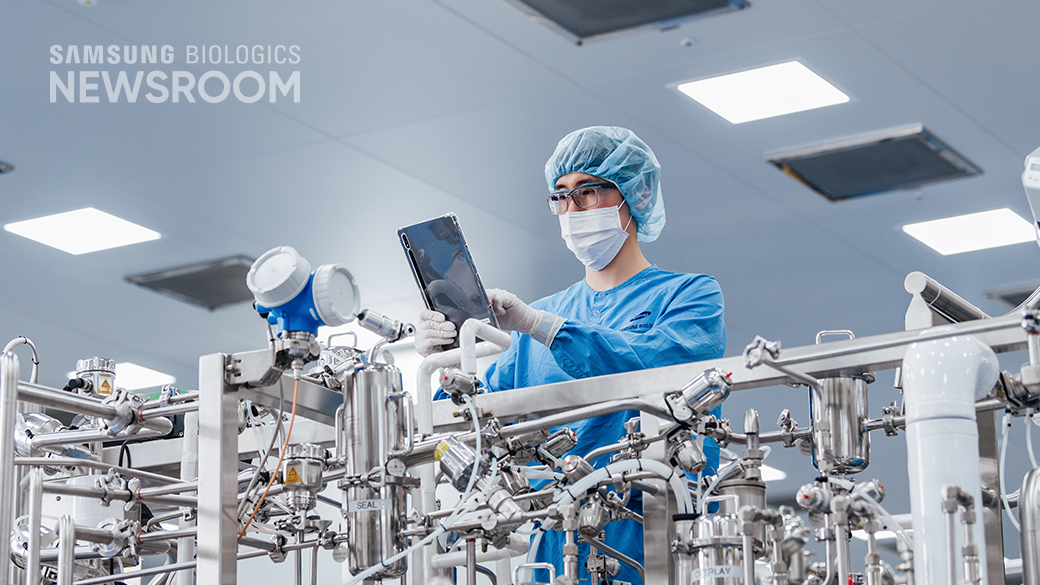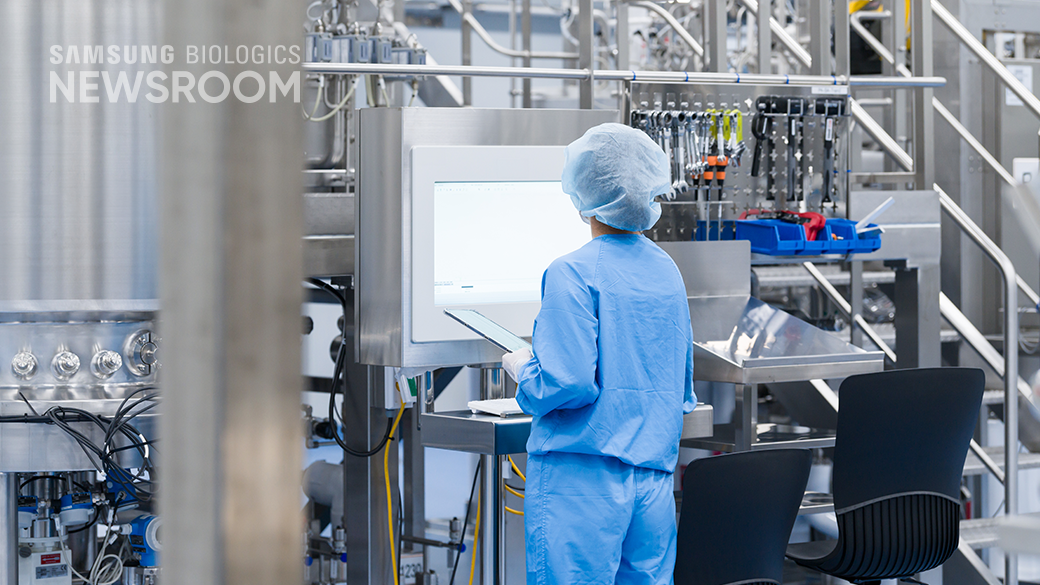
Client centricity inspires the framework of operational excellence at Samsung Biologics. Establishing a digital infrastructure that delivers what clients currently and will need down the road is a cornerstone of trusted CDMO operations.
Samsung Biologics defines a trusted CDMO as a partner that enables mutual checks and balances with its clients through continuous improvement. To earn trust, the global CDMO has been executing its own digital transformation strategy, helping clients advance their project timelines without compromising quality.
“The essence of our digital strategy is to enable our clients to make timely decisions for their best projects whenever inquired by leveraging real-time data we provide,” says Heokgeon Kwon, director of information strategy, who oversees digital transformation initiatives at Samsung Biologics. “The goal is straightforward: deliver what clients need and drive client satisfaction.”
All-in-one, digitized system for building client trust
Samsung Biologics digitizes several thousand pages of once hand-written documents into an integrated manufacturing execution system (MES). Given the salience of every data point generated from cell line development to aseptic fill/finish on meeting timelines and handling regulatory hurdles, the global CDMO seeks to eradicate any chance of human error in collecting or analyzing clients’ project data, thereby preserving data compliance.
Drug development/manufacturing projects require continuity, consistency, and standardization of data work. Samsung Biologics’ digitized system is embedded with those requirements, facilitating collaboration between the CDMO and its client to induce a data-driven solution. Data continuity and consistency allow tracing back records generated during development processes to identify the root cause of an issue encountered while manufacturing CGMP products. Also, standardized data-gathering processes through serialization ensure consistent data labeling regardless of its origin and thus save time once required for hand-filtering and querying data.
Process optimization via MES has been tried across manufacturing industries to unearth problems faster and strategically implement corrective actions. The biopharmaceutical industry, a relative latecomer in terms of adopting MES, is catching up fast, but not fast enough to keep up pace with the evolving biologics market.
“Much of the data work is still done by hand in the biopharmaceutical industry,” says Kwon. “But the industry also recognizes the need for accelerating the transition from hands-based to data-based information gathering, as the market demands rise for complex biologics, like bispecific antibodies and antibody-drug conjugates.”
If a CDMO doesn't provide clients with such an integrated system, they would be left vulnerable to losing meaningful manufacturing data that would have been critical for assessing quality in subsequent stages, says Kwon.

Robust digital fundamentals in place
Recent studies, like one via the Journal of Generic Medicines, have spotlighted the use of MES in biopharma operations as a base tool for operational excellence, which would bring reduced production cycles, fewer failed batches, regulatory compliance, and stringent execution of *ALCOA principles in daily operations. All told, MES builds groundwork before incorporating artificial intelligence or machine learning-based technologies into the biopharma systems, the studies say.
*ALCOA: A set of principles for data compliance in life sciences – Attributable, Legible, Contemporaneous, Original, & Accurate
Digital connectivity, an umbrella term for MES, is what Samsung Biologics offers its clients. It not only holds the CDMO accountable but also propels the company to bring transparency in every facet of operations, says Kwon.
With strong digital fundamentals under its belt, Samsung Biologics provides a correlated set of data to its clients, enabling them to leverage digitally-sorted data and develop timely solutions. Having digitized every end-to-end data in one system also enables the global CDMO to provide any data requested from its clients when they need.
“Our own digital system, we believe, is best for bringing process optimization and satisfaction to our clients,” Kwon says.
Digital transformation at Samsung Biologics is continuously being innovated as the global CDMO believes there is always a process to improve upon. In tandem with the expansion of capacity and business portfolios, Samsung Biologics continues to find ways to better support its clients with their commitment to patients.
Related contents
Media Focus Pharma 4.0: CDMOs Digitalize to Enhance Customer Value

Client centricity inspires the framework of operational excellence at Samsung Biologics. Establishing a digital infrastructure that delivers what clients currently and will need down the road is a cornerstone of trusted CDMO operations.
Samsung Biologics defines a trusted CDMO as a partner that enables mutual checks and balances with its clients through continuous improvement. To earn trust, the global CDMO has been executing its own digital transformation strategy, helping clients advance their project timelines without compromising quality.
“The essence of our digital strategy is to enable our clients to make timely decisions for their best projects whenever inquired by leveraging real-time data we provide,” says Heokgeon Kwon, director of information strategy, who oversees digital transformation initiatives at Samsung Biologics. “The goal is straightforward: deliver what clients need and drive client satisfaction.”
All-in-one, digitized system for building client trust
Samsung Biologics digitizes several thousand pages of once hand-written documents into an integrated manufacturing execution system (MES). Given the salience of every data point generated from cell line development to aseptic fill/finish on meeting timelines and handling regulatory hurdles, the global CDMO seeks to eradicate any chance of human error in collecting or analyzing clients’ project data, thereby preserving data compliance.
Drug development/manufacturing projects require continuity, consistency, and standardization of data work. Samsung Biologics’ digitized system is embedded with those requirements, facilitating collaboration between the CDMO and its client to induce a data-driven solution. Data continuity and consistency allow tracing back records generated during development processes to identify the root cause of an issue encountered while manufacturing CGMP products. Also, standardized data-gathering processes through serialization ensure consistent data labeling regardless of its origin and thus save time once required for hand-filtering and querying data.
Process optimization via MES has been tried across manufacturing industries to unearth problems faster and strategically implement corrective actions. The biopharmaceutical industry, a relative latecomer in terms of adopting MES, is catching up fast, but not fast enough to keep up pace with the evolving biologics market.
“Much of the data work is still done by hand in the biopharmaceutical industry,” says Kwon. “But the industry also recognizes the need for accelerating the transition from hands-based to data-based information gathering, as the market demands rise for complex biologics, like bispecific antibodies and antibody-drug conjugates.”
If a CDMO doesn't provide clients with such an integrated system, they would be left vulnerable to losing meaningful manufacturing data that would have been critical for assessing quality in subsequent stages, says Kwon.

Robust digital fundamentals in place
Recent studies, like one via the Journal of Generic Medicines, have spotlighted the use of MES in biopharma operations as a base tool for operational excellence, which would bring reduced production cycles, fewer failed batches, regulatory compliance, and stringent execution of *ALCOA principles in daily operations. All told, MES builds groundwork before incorporating artificial intelligence or machine learning-based technologies into the biopharma systems, the studies say.
*ALCOA: A set of principles for data compliance in life sciences – Attributable, Legible, Contemporaneous, Original, & Accurate
Digital connectivity, an umbrella term for MES, is what Samsung Biologics offers its clients. It not only holds the CDMO accountable but also propels the company to bring transparency in every facet of operations, says Kwon.
With strong digital fundamentals under its belt, Samsung Biologics provides a correlated set of data to its clients, enabling them to leverage digitally-sorted data and develop timely solutions. Having digitized every end-to-end data in one system also enables the global CDMO to provide any data requested from its clients when they need.
“Our own digital system, we believe, is best for bringing process optimization and satisfaction to our clients,” Kwon says.
Digital transformation at Samsung Biologics is continuously being innovated as the global CDMO believes there is always a process to improve upon. In tandem with the expansion of capacity and business portfolios, Samsung Biologics continues to find ways to better support its clients with their commitment to patients.
Related contents
Media Focus Pharma 4.0: CDMOs Digitalize to Enhance Customer Value
- CDO
- CGMP
- ADC
- Bio Campus
- IR
- CMO
Share article